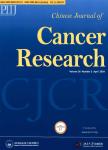XPC Polymorphism Increases Risk of Digestive System Cancers:Current Evidence from A Meta-Analysis
XPC Polymorphism Increases Risk of Digestive System Cancers: Current Evidence from A Meta-Analysis作者机构:Department of Epidemiology and Health StatisticsZhejiang University School of MedicineHangzhou 310058China
出 版 物:《Chinese Journal of Cancer Research》 (中国癌症研究(英文版))
年 卷 期:2012年第24卷第3期
页 面:181-189页
核心收录:
学科分类:0710[理学-生物学] 07[理学] 071002[理学-动物学] 0713[理学-生态学]
基 金:supported by the National Natural Science Foundation of China (No.81072356)
主 题:XPC Polymorphism Digestive system cancer Meta-anaiysis
摘 要:Objective: Xeroderma pigmentosum complementation group C (XPC) participates in the initial recognition of DNA damage during nucleotide excision repair process in global genomic repair. Our meta-analysis was performed to evaluate the association between three polymorphisms (Lys939Gln, PAT+/- and Ala499Val) of XPC gene and risk of digestive system cancers. Methods: All the relevant case-control studies published to April 2011 were identified through searching PubMed. Digestive system cancer risk with the three polymorphisms was estimated for each study by odds ratio (OR) with its 95% confidence interval (95% CI). Results: We found an increased overall risk for digestive system cancers in all three models of Lys939Gln AC (AC/CC vs. AA: OR, 1.20; 95% CI, 1.11-1.30; CC vs. AC/AA: OR, 1.24; 95% CI, 1.11-1.39; CC vs. AA: OR, 1.36; 95% CI, 1.21-1.53). When strati?ed by ethnicity, results remained significant in Asian population (AC/CC vs. AA: OR, 1.18; 95% CI, 1.02-1.37; CC vs. AC/AA: OR, 1.32; 95% CI, 1.1-1.51; CC vs. AA: OR, 1.35; 95% CI, 1.08-1.70), but not for Caucasians. However for Ala499Val CT, a significant protective effect of T allele was only observed in the dominant model. Otherwise, no significant results were observed for PAT+/-. Conclusion: XPC Lys939Gln AC polymorphism may play an important role in digestive system cancer susceptibility.



